We may not have the course you’re looking for. If you enquire or give us a call on +31 208081674 and speak to our training experts, we may still be able to help with your training requirements.
Training Outcomes Within Your Budget!
We ensure quality, budget-alignment, and timely delivery by our expert instructors.

In the whirlwind world of marketing, where every pound counts, how do you ensure that your investments are hitting the mark? Have you ever wondered why some campaigns soar while others barely make a dent? Enter ROI Marketing, the magical metric that reveals the profitability of your marketing efforts. The secret often lies in understanding and optimising your ROI.
By focusing on ROI, businesses can identify which strategies are worth pursuing and which ones need a rethink. In this blog, we’ll dive into the depths of ROI Marketing, exploring its importance, calculation methods, and strategies to enhance it. Ready to unlock the secrets of ROI and transform your campaigns? Let’s get started.
Table of Contents
1) What is ROI in Marketing?
2) Why is ROI Important?
3) How to Calculate ROI in Excel?
4) What is a Good ROI Marketing?
5) Strategies for Enhancing Marketing ROI
6) The Difficulties of Evaluating Marketing ROI
7) Conclusion
What is ROI in Marketing?
ROI in Marketing measures the profitability of your marketing efforts by comparing net profit to the cost of the investment. In simpler terms, it shows how much money you earn back from the amount you spend on marketing. This metric is crucial for marketers as it helps assess the effectiveness of their campaigns, enabling them to make educated decisions about the allocation of resources.
By understanding ROI, businesses can identify high-performing strategies. It also helps justify marketing expenditures and refine approaches to maximise returns. Ultimately, this drives growth and ensures that marketing efforts contribute positively to the bottom line.
Why is ROI Important?
Understanding ROI is fundamental for several reasons:
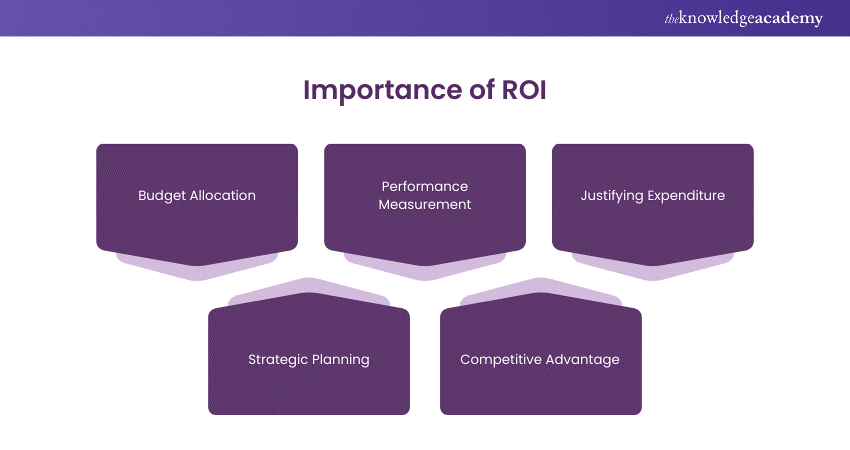
1) Budget Allocation: It helps in determining which marketing channels are most effective, allowing for better allocation of resources.
2) Performance Measurement: By calculating ROI, businesses can measure the success of their campaigns in quantitative terms.
3) Justifying Expenditure: Demonstrating a high ROI can justify marketing budgets to stakeholders.
4) Strategic Planning: ROI insights enable marketers to refine strategies and focus on high-performing tactics.
5) Competitive Advantage: Knowing what works and what doesn’t provide a competitive edge in the market.
Learn the fundamentals of Marketing - join our Introduction To Marketing Training and elevate your career with essential skills!
How to Calculate ROI in Excel?
Calculating ROI can be simplified using Excel. Follow these steps to determine your marketing ROI accurately:
1) Open Excel
Start by launching Microsoft Excel and creating a new workbook.
2) Label Cells
Label your cells for clarity. For instance, cell A1 can be used for "Investment Amount" and cell B1 for "Financial Gain".
3) Enter the Investment Amount and Financial Gain
a) In cell A2, input the investment amount (e.g., £2,482.00)
b) In cell B2, input the financial gain from the investment (e.g., £2,609.00)
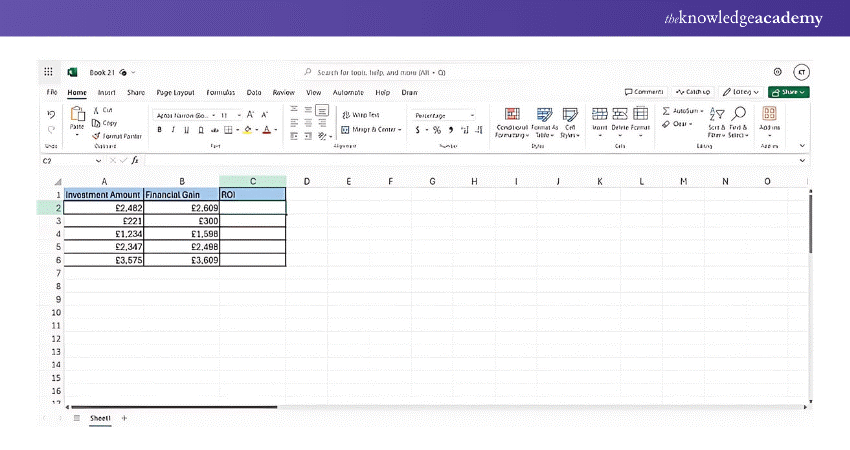
4) Input the Formula
In cell C1, label it "ROI". In cell C2, enter the formula below to determine ROI:
= (B2 - A2) / A2
= (B2 - A2) / A2
This formula subtracts the investment amount from the financial gain, divides it from the investment amount, and provides the ROI as a decimal.
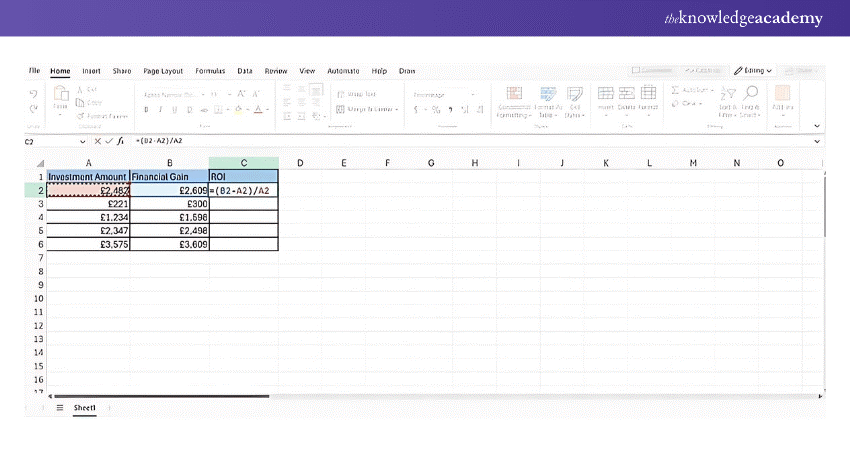
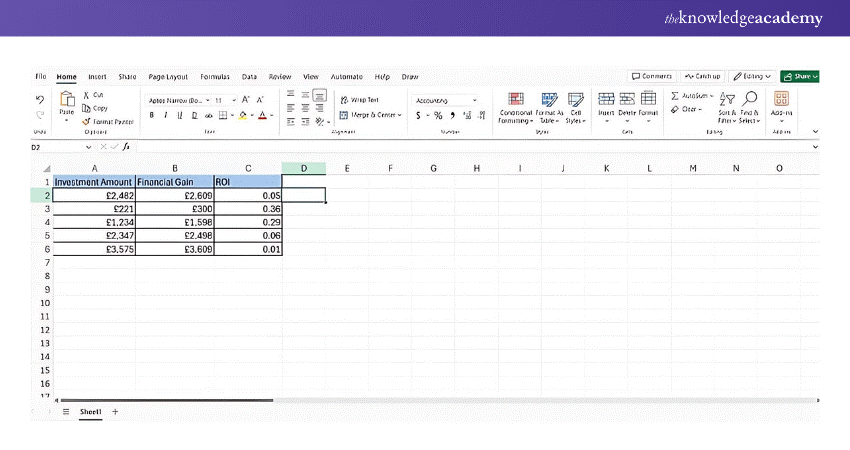
5) Change to Percentage
To convert the result into a percentage, select cell C2, go to the Home tab, and click on the percentage style button. This will show the ROI as a percentage, making it easier to interpret.
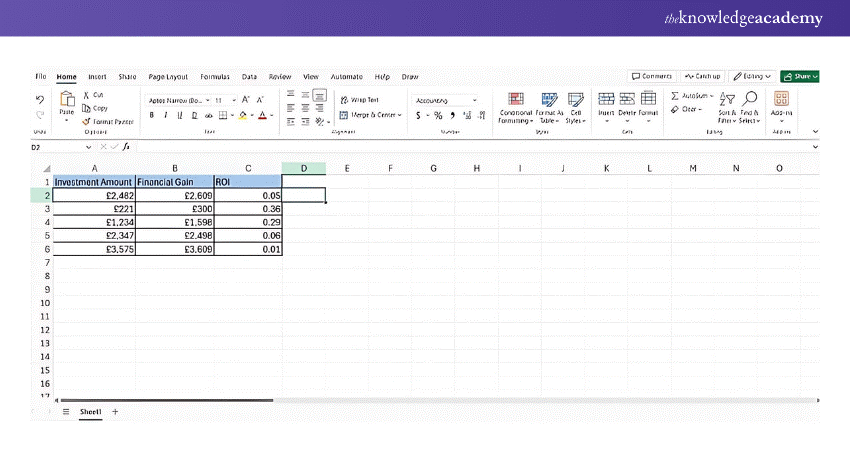
Master Excel with our in-depth Microsoft Excel Courses to increase your proficiency and productivity – join now for top-tier skills!
What is a Good ROI Marketing?
A good ROI in Marketing can differ significantly by industry and business, but generally, an ROI of 5:1 is considered strong, meaning you earn $5 for every $1 spent. An ROI of 10:1 or higher is deemed exceptional.
Establishing realistic benchmarks based on industry standards and historical performance data is crucial. This helps set achievable goals, understand success in your context, and ensure marketing efforts are effective and efficient.
Become an Excel Accounting whiz – register in our Excel For Accounting Course and elevate your career prospects!
Strategies for Enhancing Marketing ROI
Boosting your marketing ROI requires a strategic approach. Here are some effective strategies:
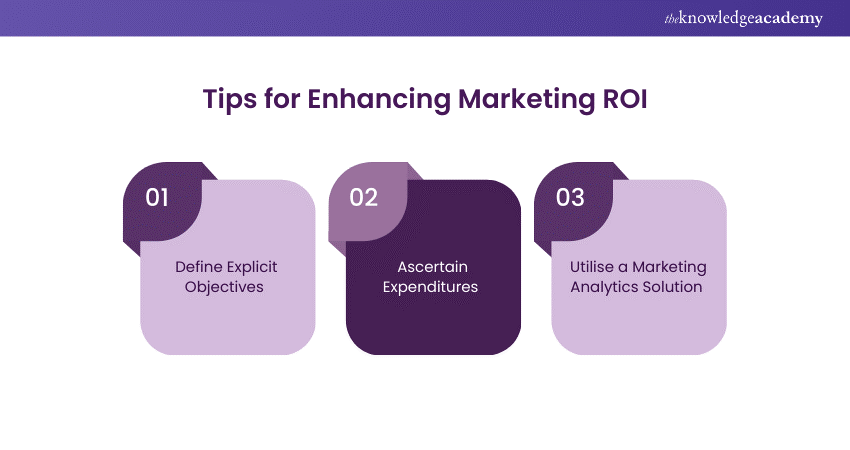
1) Define Explicit Objectives
1) Specific: Clearly state your goals to provide direction and importance.
2) Measurable: Set criteria for tracking progress and evaluating success.
3) Achievable: Ensure goals are realistic, given available resources and constraints.
4) Relevant: Align objectives with broader business strategies to ensure meaningful contributions.
5) Time-bound: Establish deadlines to promote urgency and accountability.
6) Benefit: SMART objectives help develop coherent strategies, monitor performance, and adjust tactics efficiently.
2) Ascertain Expenditures
1) Direct Costs: Include expenses like advertising spending, promotions, and content creation.
2) Indirect Costs: Account for software subscriptions, personnel salaries, and overheads.
3) Detailed Records: Maintain thorough financial records for accurate cost tracking.
4) Optimise Budget: Identify effective and ineffective expenditures to better allocate resources.
5) Financial Planning: Enable accurate forecasting and ensure justified spending.
6) Benefit: Understanding costs helps optimise budget allocations and reduce unnecessary expenses.
3) Utilise a Marketing Analytics Solution
1) Real-time Insights: Tools like Google Analytics, HubSpot, and Marketo provide up-to-date data.
2) Comprehensive Data: Track metrics such as website traffic, conversion rates, and user behaviour.
3) Data-driven Decisions: Use insights to understand customer interactions and improve strategies.
4) Optimisation: Adjust marketing tactics promptly based on analytics to maximise returns.
5) Performance Tracking: Monitor the effectiveness of different strategies continuously.
6) Benefit: Enhances campaign effectiveness by aligning efforts with business goals and improving ROI.
Boost your business success with advanced marketing strategies – sign up to our Business Marketing Strategies Training now to learn and excel!
The Difficulties of Evaluating Marketing ROI
Evaluating marketing ROI is not without its challenges. Some of the common difficulties include:
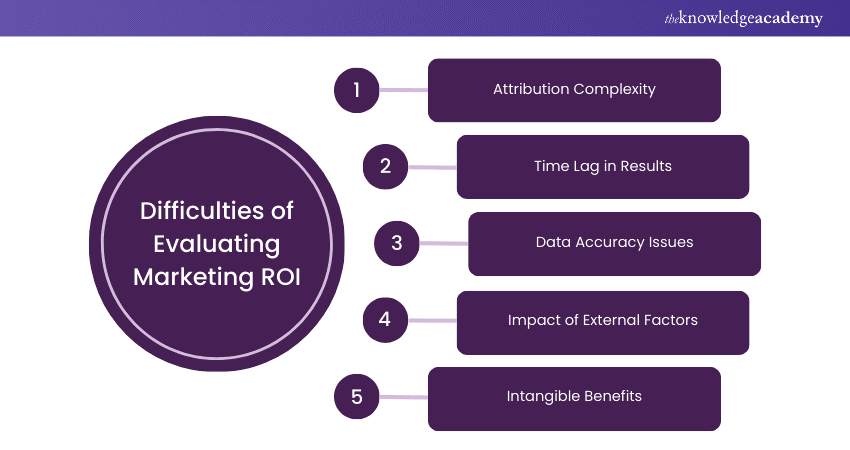
1) Attribution: Determining which specific marketing efforts led to conversions can be complex, especially with multi-channel campaigns. It’s challenging to attribute success accurately when multiple touchpoints influence the customer journey.
2) Time Lag: Marketing efforts might not yield immediate results, making it difficult to measure ROI in the short term. Long sales cycles and delayed impacts can obscure the true effectiveness of campaigns.
3) Data Accuracy: Ensuring accurate, complete data collection is challenging due to incomplete tracking, data silos, and platform inconsistencies.
4) External Factors: Market conditions, competition, and economic changes can significantly impact ROI, making it hard to attribute success or failure solely to marketing efforts.
5) Intangible Benefits: Marketing efforts often generate intangible benefits like Awareness of the brand and customer loyalty which are difficult to quantify and include in ROI calculations.
6) Changing Metrics: The dynamic nature of digital marketing means that metrics and benchmarks can change rapidly, complicating long-term ROI evaluation and comparisons.
Become a marketing expert with our in-depth Marketing Courses - sign up now to gain cutting-edge skills and insights!
Conclusion
ROI Marketing is essential for ensuring your marketing efforts are profitable and efficient. By understanding and optimising ROI, businesses can make informed decisions, allocate resources wisely, and achieve better results. Implement these strategies to elevate your marketing game and maximise your returns.
Unlock financial freedom by mastering passive income strategies – sign up for our Passive Income Course today!
Frequently Asked Questions

The expected ROI on marketing can vary, but generally, a ratio of 5:1 is strong, meaning you earn £5 for every £1 spent. An exceptional ROI is 10:1 or higher, indicating highly effective marketing efforts.

To track ROI in digital marketing, use analytics tools like Google Analytics, HubSpot, or Marketo. Monitor important metrics, such as website traffic, revenue generated and conversion rates, from campaigns. Calculate ROI by comparing these metrics against marketing costs.

The Knowledge Academy takes global learning to new heights, offering over 30,000 online courses across 490+ locations in 220 countries. This expansive reach ensures accessibility and convenience for learners worldwide.
Alongside our diverse Online Course Catalogue, encompassing 17 major categories, we go the extra mile by providing a plethora of free educational Online Resources like News updates, Blogs, videos, webinars, and interview questions. Tailoring learning experiences further, professionals can maximise value with customisable Course Bundles of TKA.

The Knowledge Academy’s Knowledge Pass, a prepaid voucher, adds another layer of flexibility, allowing course bookings over a 12-month period. Join us on a journey where education knows no bounds.

The Knowledge Academy offers various Marketing Courses, including Introduction to Marketing Training, Marketing Budget Course, Business Marketing Strategies Training and Passive Income Course. These courses cater to different skill levels, providing comprehensive insights into Marketing Campaign.
Our Digital Marketing Blogs cover a range of topics related to Marketing, offering valuable resources, best practices, and industry insights. Whether you are a beginner or looking to advance your Marketing skills, The Knowledge Academy's diverse courses and informative blogs have got you covered.
Upcoming Digital Marketing Resources Batches & Dates
Date
 Introduction to Marketing Training
Introduction to Marketing Training
Fri 10th Jan 2025
Fri 14th Mar 2025
Fri 9th May 2025
Fri 11th Jul 2025
Fri 12th Sep 2025
Fri 14th Nov 2025







 Top Rated Course
Top Rated Course



 If you wish to make any changes to your course, please
If you wish to make any changes to your course, please


